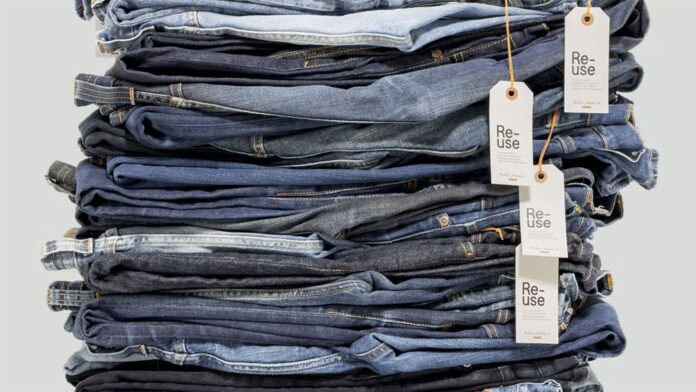As sustainability becomes an increasingly important consideration in the fashion industry, innovative materials and manufacturing processes are being explored to reduce environmental impact. Denim Khadi, a fusion of traditional Indian Khadi fabric and denim, offers a sustainable fabric alternative to regular denim. This unique fabric combines the charm and versatility of denim with the eco-friendly and socially conscious aspects of Khadi. In this blog, we delve into the characteristics and advantages of Denim Khadi as a sustainable fabric choice.
Why cotton demic is not a safe option
- Cotton denim requires a ton of water which ultimately affects the environment. If reports are to be believed a pair of jeans needs 1,700 gallons of water.
- Along with it, producing denim requires electricity and many oils which made is harmful for environment
- It also make the river water dirty with its chemical when you washed it off.
Traditional Craftsmanship
Denim Khadi brings together the heritage of two iconic fabrics: Khadi and denim. Khadi is a handspun and handwoven fabric, deeply rooted in India’s history and associated with Mahatma Gandhi’s movement for self-reliance. By incorporating Khadi into Denim Khadi, traditional craftsmanship is celebrated, preserving the artistry and skills of local artisans. This sustainable fabric choice helps sustain the livelihoods of rural artisans and promotes the continuation of traditional weaving techniques.
Organic and Natural Fibers
Denim Khadi typically uses organic and natural fibers, such as organic cotton, hemp, or linen. Organic cotton eliminates the use of harmful pesticides and chemicals, reducing environmental pollution and protecting the health of farmers. Hemp and linen are renewable and eco-friendly fibers that require minimal water and land to grow. By opting for Denim Khadi made from organic and natural fibers, you contribute to a healthier environment and support sustainable farming practices.
Reduced Water Footprint
Water scarcity is a significant concern in the fashion industry, particularly in denim production. Traditional denim manufacturing requires large amounts of water for fabric dyeing and finishing processes. Denim Khadi offers a more sustainable alternative with a reduced water footprint. The handspun and handwoven nature of Khadi involves minimal water usage compared to industrial textile production. By choosing Denim Khadi, you help conserve water resources and mitigate the impact on water-stressed regions.
Low Carbon Footprint
Regular denim production involves energy-intensive processes, such as cotton cultivation, fiber processing, dyeing, and finishing. In contrast, Denim Khadi’s production methods have a significantly lower carbon footprint. Hand spinning and weaving techniques used in Khadi production require less energy compared to industrial processes. Additionally, using organic and natural fibers reduces the reliance on fossil fuel-based inputs. By wearing Denim Khadi, you support a more sustainable fashion industry by reducing greenhouse gas emissions and mitigating climate change.
Versatile and Timeless Style
Denim Khadi offers a versatile and timeless style that can be dressed up or down for various occasions. Its fusion of denim’s rugged appeal and Khadi’s handcrafted charm creates a unique aesthetic. Denim Khadi garments possess a distinctive texture and character, reflecting the artisanal nature of the fabric. This sustainable alternative to regular denim allows you to make fashion choices that align with your values without compromising on style or trend.
Socially Responsible
Choosing Denim Khadi supports fair trade and social responsibility. The production of Khadi involves decentralized and community-based initiatives, providing employment opportunities for rural artisans, particularly women. By embracing Denim Khadi textile, you contribute to empowering local communities and preserving traditional skills. This fabric choice fosters social and economic development, ensuring that artisans receive fair wages and recognition for their craftsmanship.
Durability and Longevity
Denim Khadi, like regular denim, is known for its durability. The combination of handspun fibres and sturdy weaving techniques makes Denim Khadi a long-lasting wholesale fabric choice. The durability of this sustainable fabric ensures that your garments have a longer lifespan, reducing the need for frequent replacements and minimizing textile waste. By investing in Denim Khadi pieces, you contribute to a more sustainable and circular fashion system.
Conclusion
Denim Khadi presents a sustainable alternative to regular denim, combining the timeless appeal of denim with the eco-friendly characteristics of Khadi. This fabric choice celebrates traditional craftsmanship, reduces water and carbon footprints, and supports fair trade practices. Embracing Denim Khadi allows you to make conscious fashion choices that prioritize sustainability without compromising on style and quality. By adopting Denim Khadi, you contribute to a more sustainable and socially responsible fashion industry.
Despite knowing the benefits, people usually considered the denim fabric more than Khadi denim due to many reasons like lack of availability, fewer options, and many more. However, due to climate awareness major parts are opting for khadi denim as a sustainable alternative. Yet we have a long to cross to achieve desired results. In order to contribute to sustainable practice, Fabriclore is consistently working towards the direction. Here, you can enjoy a grand variety of wholesale fabrics that support sustainable practices. You can also customize your own design as per your preferences.








